Australian Contract Law: Larceny, LEPRA, and Police Powers Analysis
VerifiedAdded on 2021/05/31
|9
|1737
|17
Report
AI Summary
This report examines the concepts of larceny and the powers of police officers in Australia, focusing on the Law Enforcement (Powers & Responsibilities) Act 2002 (LEPRA). The paper defines larceny, differentiating it from other forms of crime, and analyzes the case study 'It is not yours until you pay' in relation to larceny. It then explores police powers regarding search, questioning, and arrest under LEPRA, referencing relevant sections of the Act and the Code of Practice. The report also addresses criticisms of LEPRA and the Rule of Law, and offers alternative approaches to dealing with larceny. The analysis considers the powers of police officers, the legal framework, and the implications of the law, providing a comprehensive overview of the subject matter.
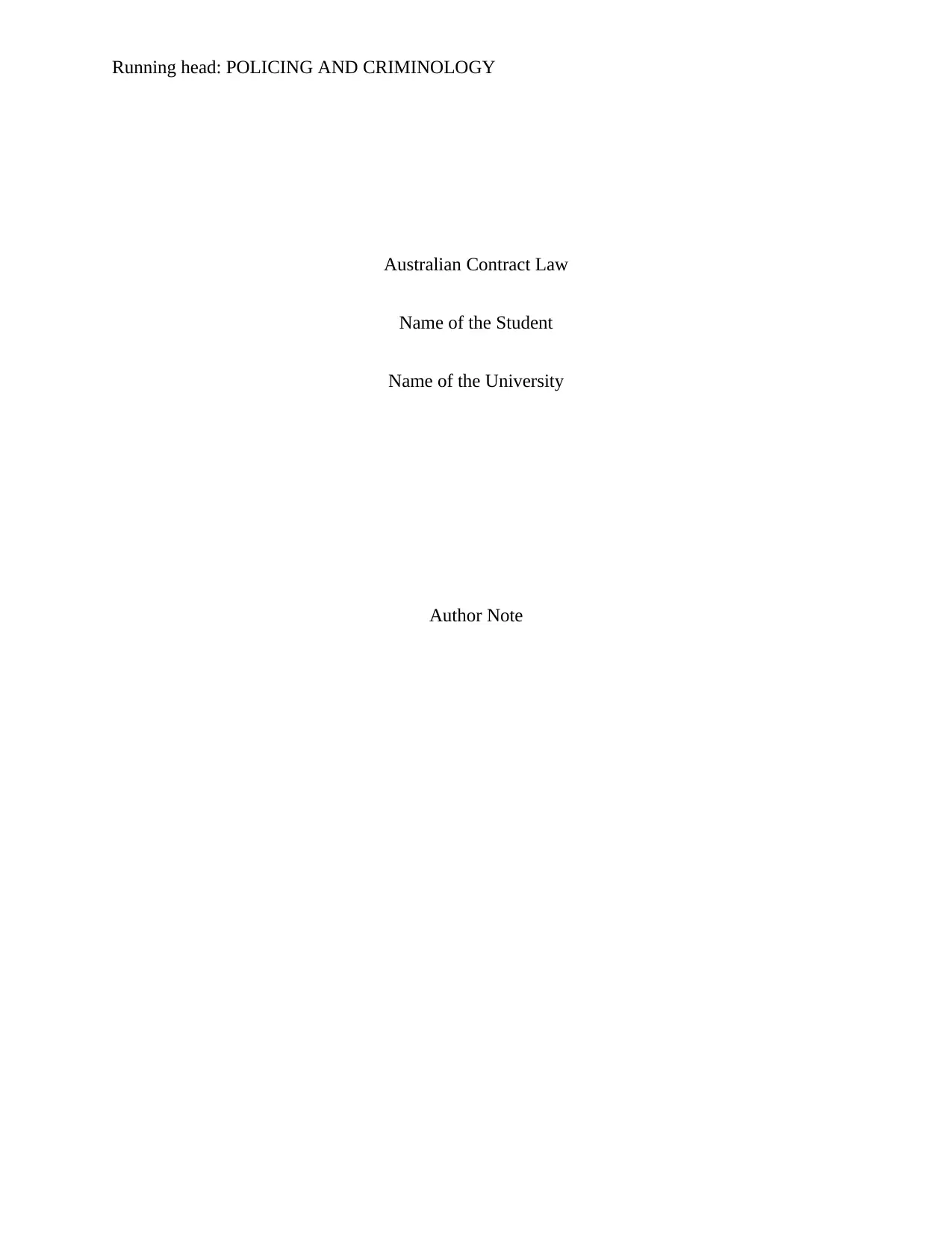
Running head: POLICING AND CRIMINOLOGY
Australian Contract Law
Name of the Student
Name of the University
Author Note
Australian Contract Law
Name of the Student
Name of the University
Author Note
Paraphrase This Document
Need a fresh take? Get an instant paraphrase of this document with our AI Paraphraser
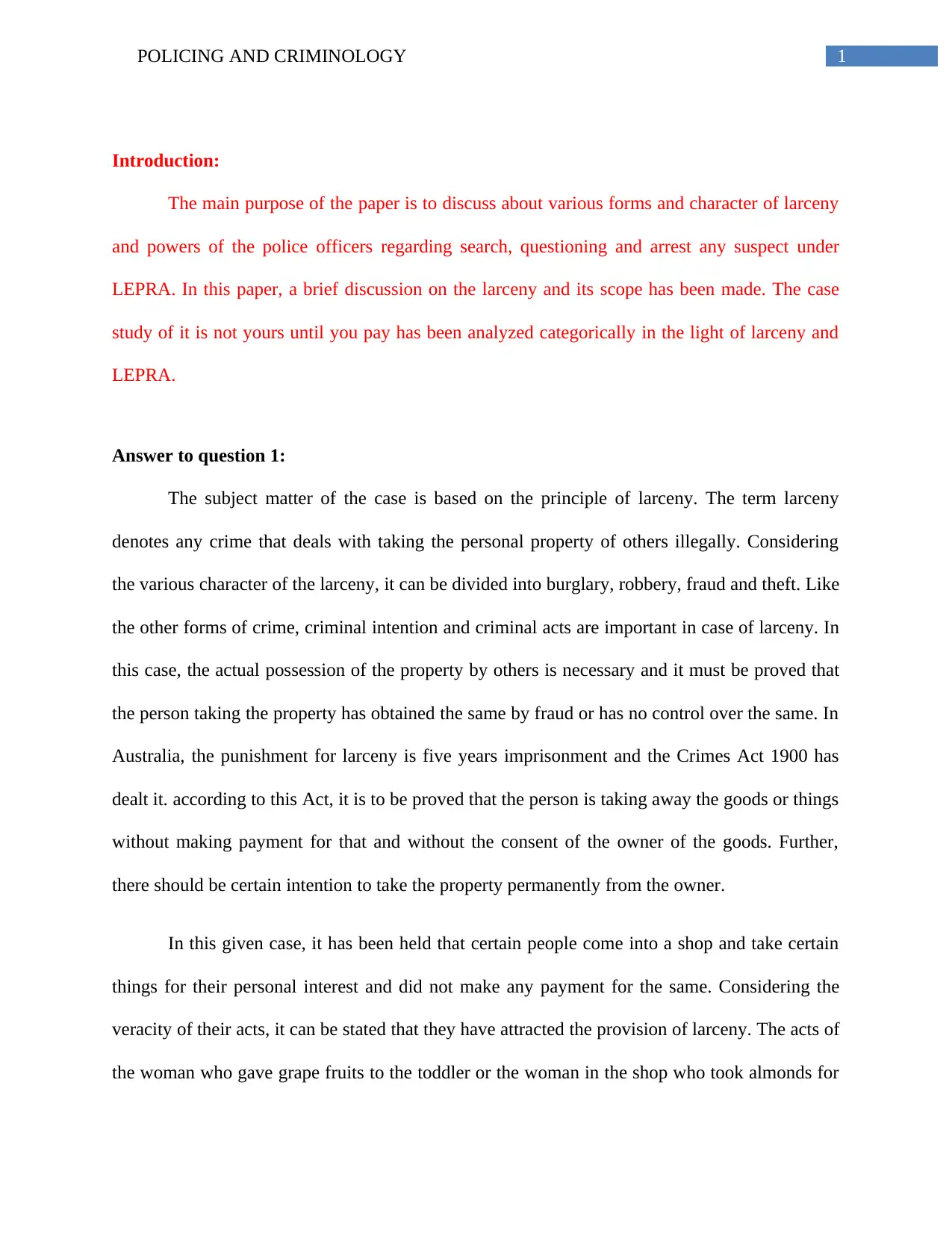
1POLICING AND CRIMINOLOGY
Introduction:
The main purpose of the paper is to discuss about various forms and character of larceny
and powers of the police officers regarding search, questioning and arrest any suspect under
LEPRA. In this paper, a brief discussion on the larceny and its scope has been made. The case
study of it is not yours until you pay has been analyzed categorically in the light of larceny and
LEPRA.
Answer to question 1:
The subject matter of the case is based on the principle of larceny. The term larceny
denotes any crime that deals with taking the personal property of others illegally. Considering
the various character of the larceny, it can be divided into burglary, robbery, fraud and theft. Like
the other forms of crime, criminal intention and criminal acts are important in case of larceny. In
this case, the actual possession of the property by others is necessary and it must be proved that
the person taking the property has obtained the same by fraud or has no control over the same. In
Australia, the punishment for larceny is five years imprisonment and the Crimes Act 1900 has
dealt it. according to this Act, it is to be proved that the person is taking away the goods or things
without making payment for that and without the consent of the owner of the goods. Further,
there should be certain intention to take the property permanently from the owner.
In this given case, it has been held that certain people come into a shop and take certain
things for their personal interest and did not make any payment for the same. Considering the
veracity of their acts, it can be stated that they have attracted the provision of larceny. The acts of
the woman who gave grape fruits to the toddler or the woman in the shop who took almonds for
Introduction:
The main purpose of the paper is to discuss about various forms and character of larceny
and powers of the police officers regarding search, questioning and arrest any suspect under
LEPRA. In this paper, a brief discussion on the larceny and its scope has been made. The case
study of it is not yours until you pay has been analyzed categorically in the light of larceny and
LEPRA.
Answer to question 1:
The subject matter of the case is based on the principle of larceny. The term larceny
denotes any crime that deals with taking the personal property of others illegally. Considering
the various character of the larceny, it can be divided into burglary, robbery, fraud and theft. Like
the other forms of crime, criminal intention and criminal acts are important in case of larceny. In
this case, the actual possession of the property by others is necessary and it must be proved that
the person taking the property has obtained the same by fraud or has no control over the same. In
Australia, the punishment for larceny is five years imprisonment and the Crimes Act 1900 has
dealt it. according to this Act, it is to be proved that the person is taking away the goods or things
without making payment for that and without the consent of the owner of the goods. Further,
there should be certain intention to take the property permanently from the owner.
In this given case, it has been held that certain people come into a shop and take certain
things for their personal interest and did not make any payment for the same. Considering the
veracity of their acts, it can be stated that they have attracted the provision of larceny. The acts of
the woman who gave grape fruits to the toddler or the woman in the shop who took almonds for
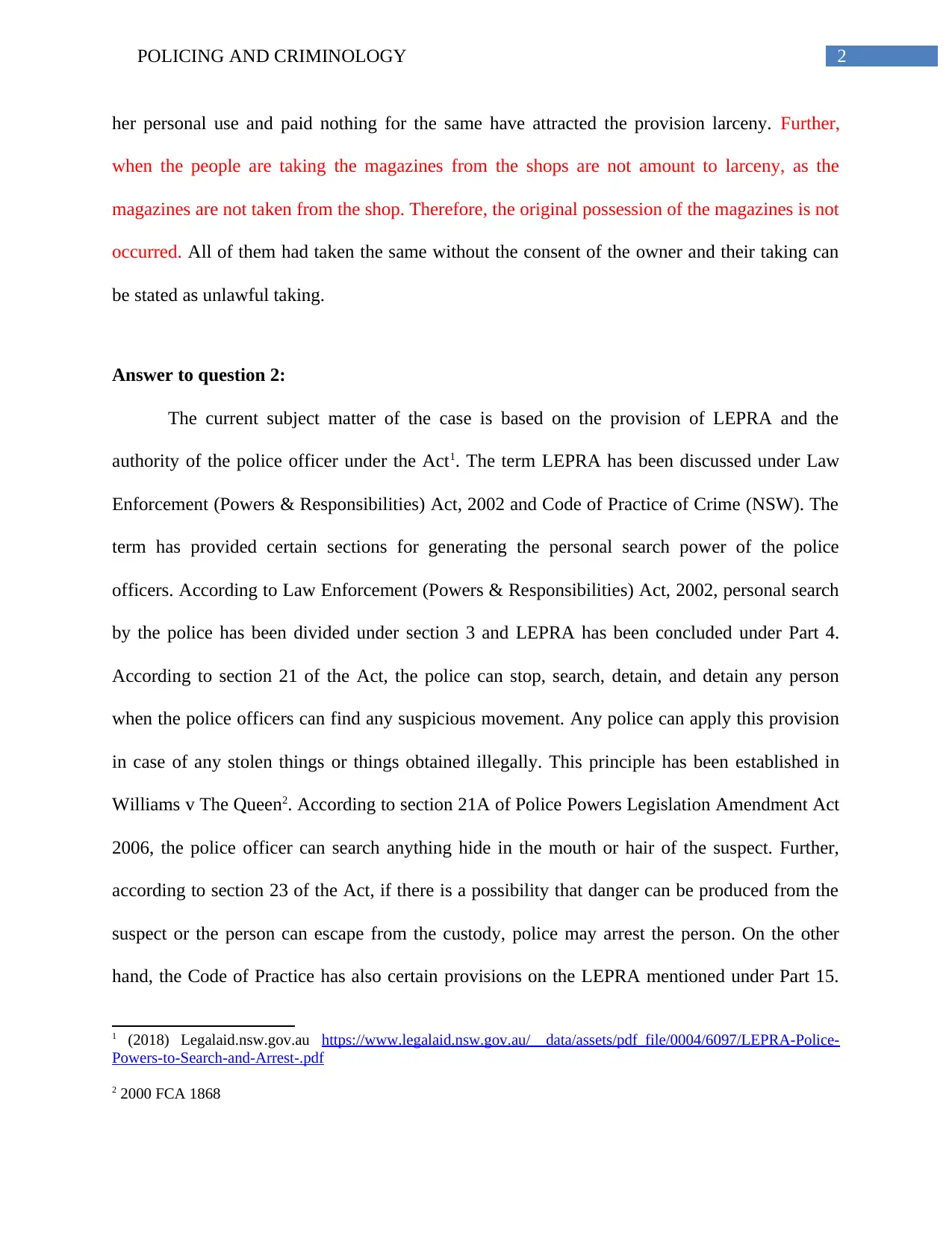
2POLICING AND CRIMINOLOGY
her personal use and paid nothing for the same have attracted the provision larceny. Further,
when the people are taking the magazines from the shops are not amount to larceny, as the
magazines are not taken from the shop. Therefore, the original possession of the magazines is not
occurred. All of them had taken the same without the consent of the owner and their taking can
be stated as unlawful taking.
Answer to question 2:
The current subject matter of the case is based on the provision of LEPRA and the
authority of the police officer under the Act1. The term LEPRA has been discussed under Law
Enforcement (Powers & Responsibilities) Act, 2002 and Code of Practice of Crime (NSW). The
term has provided certain sections for generating the personal search power of the police
officers. According to Law Enforcement (Powers & Responsibilities) Act, 2002, personal search
by the police has been divided under section 3 and LEPRA has been concluded under Part 4.
According to section 21 of the Act, the police can stop, search, detain, and detain any person
when the police officers can find any suspicious movement. Any police can apply this provision
in case of any stolen things or things obtained illegally. This principle has been established in
Williams v The Queen2. According to section 21A of Police Powers Legislation Amendment Act
2006, the police officer can search anything hide in the mouth or hair of the suspect. Further,
according to section 23 of the Act, if there is a possibility that danger can be produced from the
suspect or the person can escape from the custody, police may arrest the person. On the other
hand, the Code of Practice has also certain provisions on the LEPRA mentioned under Part 15.
1 (2018) Legalaid.nsw.gov.au https://www.legalaid.nsw.gov.au/__data/assets/pdf_file/0004/6097/LEPRA-Police-
Powers-to-Search-and-Arrest-.pdf
2 2000 FCA 1868
her personal use and paid nothing for the same have attracted the provision larceny. Further,
when the people are taking the magazines from the shops are not amount to larceny, as the
magazines are not taken from the shop. Therefore, the original possession of the magazines is not
occurred. All of them had taken the same without the consent of the owner and their taking can
be stated as unlawful taking.
Answer to question 2:
The current subject matter of the case is based on the provision of LEPRA and the
authority of the police officer under the Act1. The term LEPRA has been discussed under Law
Enforcement (Powers & Responsibilities) Act, 2002 and Code of Practice of Crime (NSW). The
term has provided certain sections for generating the personal search power of the police
officers. According to Law Enforcement (Powers & Responsibilities) Act, 2002, personal search
by the police has been divided under section 3 and LEPRA has been concluded under Part 4.
According to section 21 of the Act, the police can stop, search, detain, and detain any person
when the police officers can find any suspicious movement. Any police can apply this provision
in case of any stolen things or things obtained illegally. This principle has been established in
Williams v The Queen2. According to section 21A of Police Powers Legislation Amendment Act
2006, the police officer can search anything hide in the mouth or hair of the suspect. Further,
according to section 23 of the Act, if there is a possibility that danger can be produced from the
suspect or the person can escape from the custody, police may arrest the person. On the other
hand, the Code of Practice has also certain provisions on the LEPRA mentioned under Part 15.
1 (2018) Legalaid.nsw.gov.au https://www.legalaid.nsw.gov.au/__data/assets/pdf_file/0004/6097/LEPRA-Police-
Powers-to-Search-and-Arrest-.pdf
2 2000 FCA 1868
⊘ This is a preview!⊘
Do you want full access?
Subscribe today to unlock all pages.

Trusted by 1+ million students worldwide
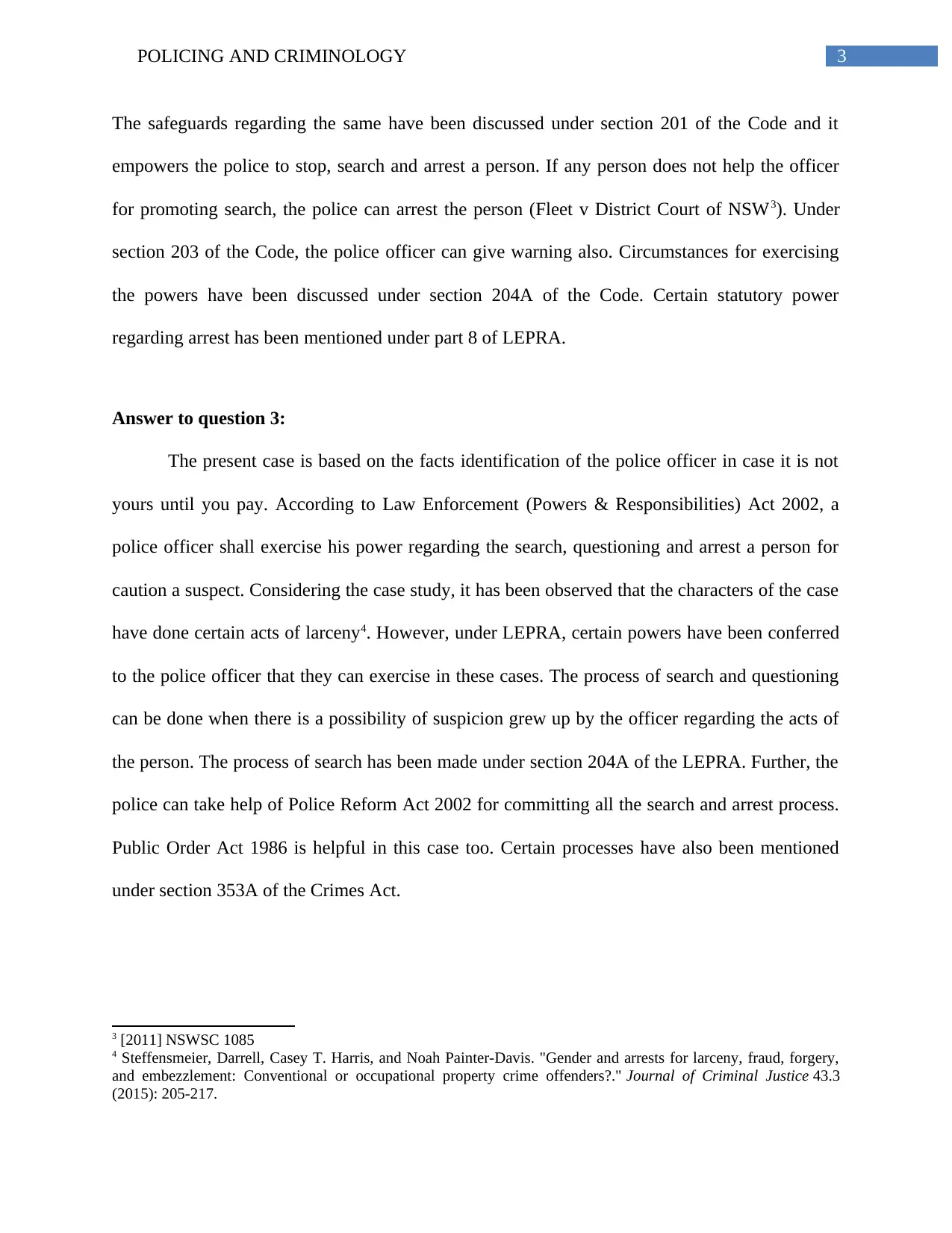
3POLICING AND CRIMINOLOGY
The safeguards regarding the same have been discussed under section 201 of the Code and it
empowers the police to stop, search and arrest a person. If any person does not help the officer
for promoting search, the police can arrest the person (Fleet v District Court of NSW3). Under
section 203 of the Code, the police officer can give warning also. Circumstances for exercising
the powers have been discussed under section 204A of the Code. Certain statutory power
regarding arrest has been mentioned under part 8 of LEPRA.
Answer to question 3:
The present case is based on the facts identification of the police officer in case it is not
yours until you pay. According to Law Enforcement (Powers & Responsibilities) Act 2002, a
police officer shall exercise his power regarding the search, questioning and arrest a person for
caution a suspect. Considering the case study, it has been observed that the characters of the case
have done certain acts of larceny4. However, under LEPRA, certain powers have been conferred
to the police officer that they can exercise in these cases. The process of search and questioning
can be done when there is a possibility of suspicion grew up by the officer regarding the acts of
the person. The process of search has been made under section 204A of the LEPRA. Further, the
police can take help of Police Reform Act 2002 for committing all the search and arrest process.
Public Order Act 1986 is helpful in this case too. Certain processes have also been mentioned
under section 353A of the Crimes Act.
3 [2011] NSWSC 1085
4 Steffensmeier, Darrell, Casey T. Harris, and Noah Painter-Davis. "Gender and arrests for larceny, fraud, forgery,
and embezzlement: Conventional or occupational property crime offenders?." Journal of Criminal Justice 43.3
(2015): 205-217.
The safeguards regarding the same have been discussed under section 201 of the Code and it
empowers the police to stop, search and arrest a person. If any person does not help the officer
for promoting search, the police can arrest the person (Fleet v District Court of NSW3). Under
section 203 of the Code, the police officer can give warning also. Circumstances for exercising
the powers have been discussed under section 204A of the Code. Certain statutory power
regarding arrest has been mentioned under part 8 of LEPRA.
Answer to question 3:
The present case is based on the facts identification of the police officer in case it is not
yours until you pay. According to Law Enforcement (Powers & Responsibilities) Act 2002, a
police officer shall exercise his power regarding the search, questioning and arrest a person for
caution a suspect. Considering the case study, it has been observed that the characters of the case
have done certain acts of larceny4. However, under LEPRA, certain powers have been conferred
to the police officer that they can exercise in these cases. The process of search and questioning
can be done when there is a possibility of suspicion grew up by the officer regarding the acts of
the person. The process of search has been made under section 204A of the LEPRA. Further, the
police can take help of Police Reform Act 2002 for committing all the search and arrest process.
Public Order Act 1986 is helpful in this case too. Certain processes have also been mentioned
under section 353A of the Crimes Act.
3 [2011] NSWSC 1085
4 Steffensmeier, Darrell, Casey T. Harris, and Noah Painter-Davis. "Gender and arrests for larceny, fraud, forgery,
and embezzlement: Conventional or occupational property crime offenders?." Journal of Criminal Justice 43.3
(2015): 205-217.
Paraphrase This Document
Need a fresh take? Get an instant paraphrase of this document with our AI Paraphraser
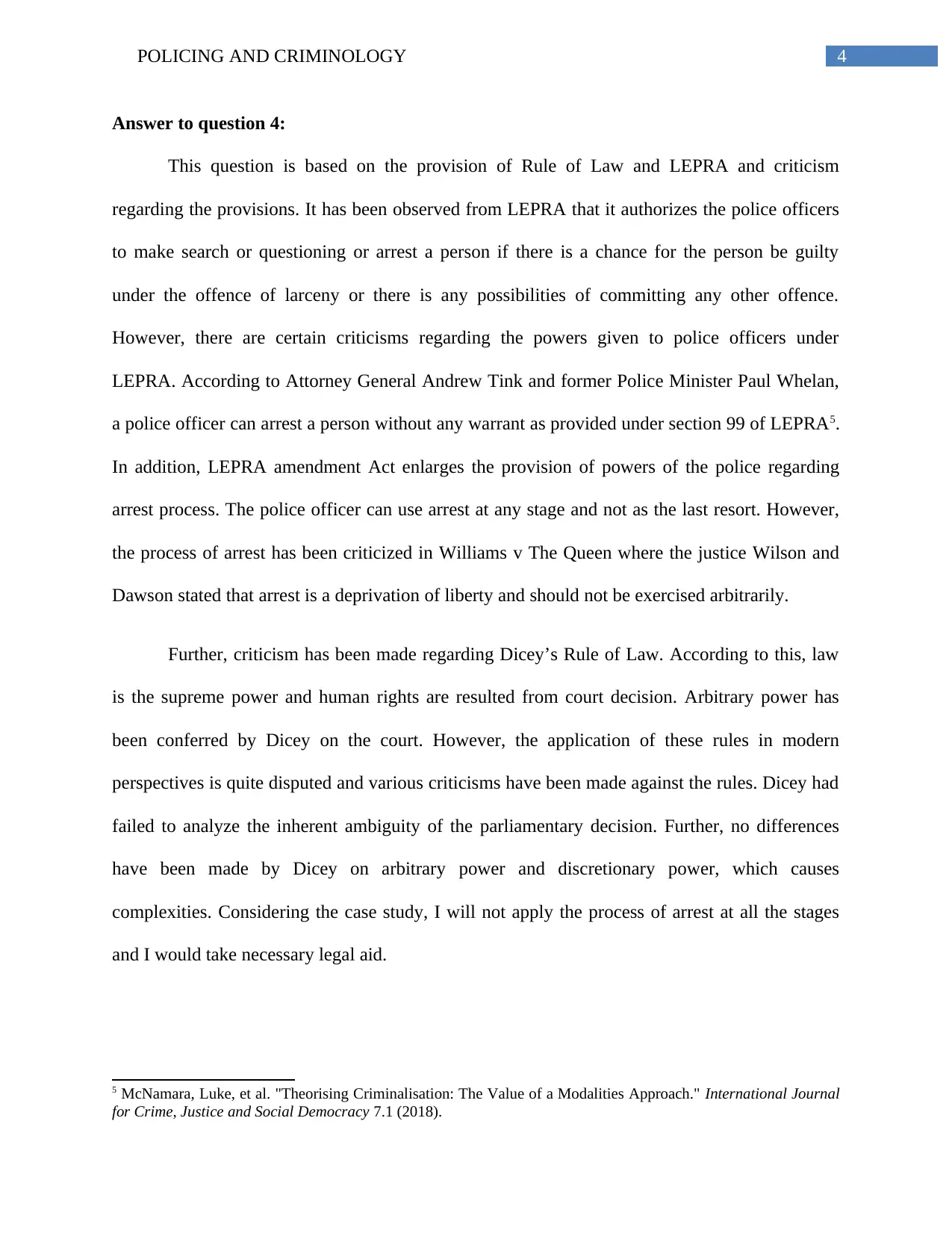
4POLICING AND CRIMINOLOGY
Answer to question 4:
This question is based on the provision of Rule of Law and LEPRA and criticism
regarding the provisions. It has been observed from LEPRA that it authorizes the police officers
to make search or questioning or arrest a person if there is a chance for the person be guilty
under the offence of larceny or there is any possibilities of committing any other offence.
However, there are certain criticisms regarding the powers given to police officers under
LEPRA. According to Attorney General Andrew Tink and former Police Minister Paul Whelan,
a police officer can arrest a person without any warrant as provided under section 99 of LEPRA5.
In addition, LEPRA amendment Act enlarges the provision of powers of the police regarding
arrest process. The police officer can use arrest at any stage and not as the last resort. However,
the process of arrest has been criticized in Williams v The Queen where the justice Wilson and
Dawson stated that arrest is a deprivation of liberty and should not be exercised arbitrarily.
Further, criticism has been made regarding Dicey’s Rule of Law. According to this, law
is the supreme power and human rights are resulted from court decision. Arbitrary power has
been conferred by Dicey on the court. However, the application of these rules in modern
perspectives is quite disputed and various criticisms have been made against the rules. Dicey had
failed to analyze the inherent ambiguity of the parliamentary decision. Further, no differences
have been made by Dicey on arbitrary power and discretionary power, which causes
complexities. Considering the case study, I will not apply the process of arrest at all the stages
and I would take necessary legal aid.
5 McNamara, Luke, et al. "Theorising Criminalisation: The Value of a Modalities Approach." International Journal
for Crime, Justice and Social Democracy 7.1 (2018).
Answer to question 4:
This question is based on the provision of Rule of Law and LEPRA and criticism
regarding the provisions. It has been observed from LEPRA that it authorizes the police officers
to make search or questioning or arrest a person if there is a chance for the person be guilty
under the offence of larceny or there is any possibilities of committing any other offence.
However, there are certain criticisms regarding the powers given to police officers under
LEPRA. According to Attorney General Andrew Tink and former Police Minister Paul Whelan,
a police officer can arrest a person without any warrant as provided under section 99 of LEPRA5.
In addition, LEPRA amendment Act enlarges the provision of powers of the police regarding
arrest process. The police officer can use arrest at any stage and not as the last resort. However,
the process of arrest has been criticized in Williams v The Queen where the justice Wilson and
Dawson stated that arrest is a deprivation of liberty and should not be exercised arbitrarily.
Further, criticism has been made regarding Dicey’s Rule of Law. According to this, law
is the supreme power and human rights are resulted from court decision. Arbitrary power has
been conferred by Dicey on the court. However, the application of these rules in modern
perspectives is quite disputed and various criticisms have been made against the rules. Dicey had
failed to analyze the inherent ambiguity of the parliamentary decision. Further, no differences
have been made by Dicey on arbitrary power and discretionary power, which causes
complexities. Considering the case study, I will not apply the process of arrest at all the stages
and I would take necessary legal aid.
5 McNamara, Luke, et al. "Theorising Criminalisation: The Value of a Modalities Approach." International Journal
for Crime, Justice and Social Democracy 7.1 (2018).
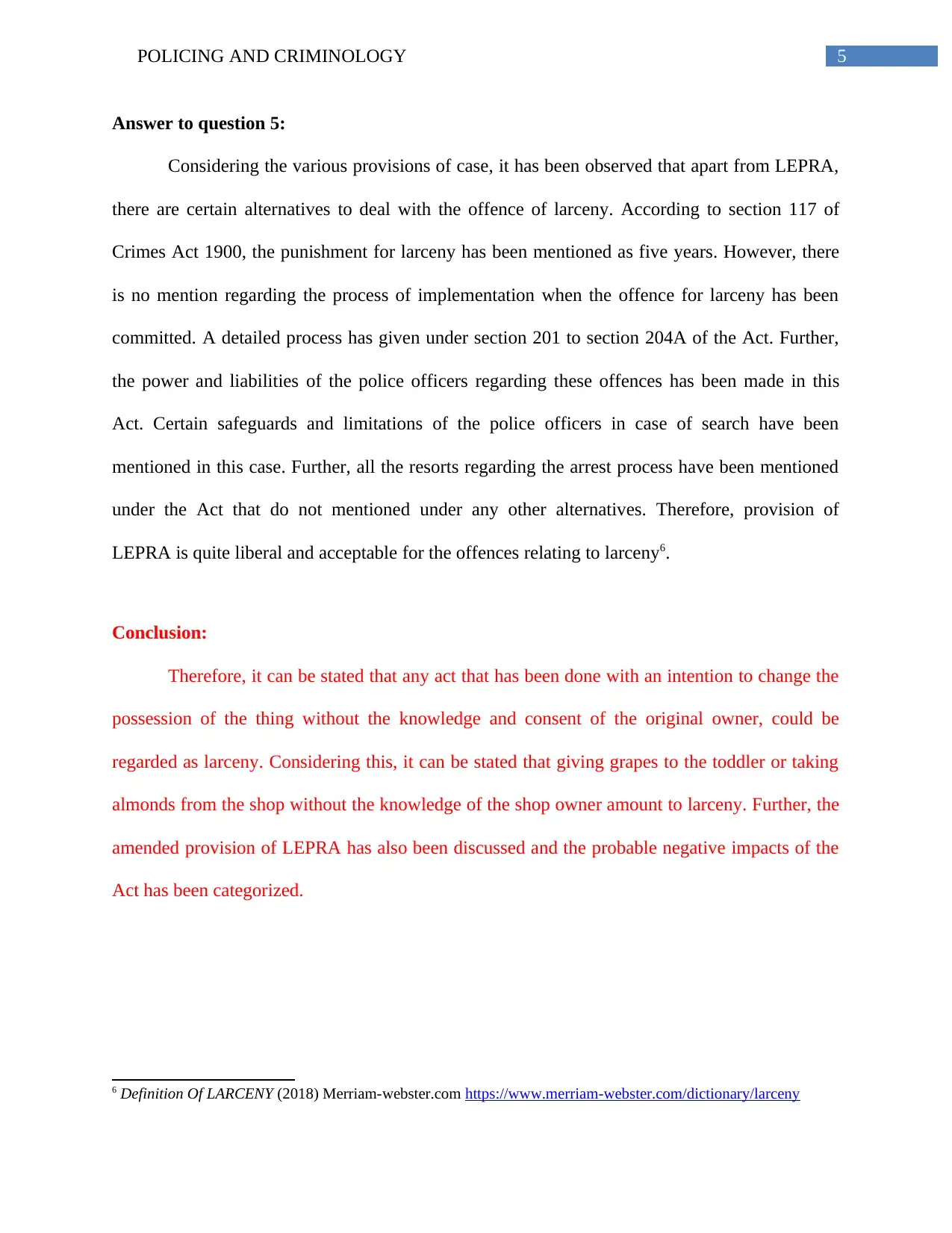
5POLICING AND CRIMINOLOGY
Answer to question 5:
Considering the various provisions of case, it has been observed that apart from LEPRA,
there are certain alternatives to deal with the offence of larceny. According to section 117 of
Crimes Act 1900, the punishment for larceny has been mentioned as five years. However, there
is no mention regarding the process of implementation when the offence for larceny has been
committed. A detailed process has given under section 201 to section 204A of the Act. Further,
the power and liabilities of the police officers regarding these offences has been made in this
Act. Certain safeguards and limitations of the police officers in case of search have been
mentioned in this case. Further, all the resorts regarding the arrest process have been mentioned
under the Act that do not mentioned under any other alternatives. Therefore, provision of
LEPRA is quite liberal and acceptable for the offences relating to larceny6.
Conclusion:
Therefore, it can be stated that any act that has been done with an intention to change the
possession of the thing without the knowledge and consent of the original owner, could be
regarded as larceny. Considering this, it can be stated that giving grapes to the toddler or taking
almonds from the shop without the knowledge of the shop owner amount to larceny. Further, the
amended provision of LEPRA has also been discussed and the probable negative impacts of the
Act has been categorized.
6 Definition Of LARCENY (2018) Merriam-webster.com https://www.merriam-webster.com/dictionary/larceny
Answer to question 5:
Considering the various provisions of case, it has been observed that apart from LEPRA,
there are certain alternatives to deal with the offence of larceny. According to section 117 of
Crimes Act 1900, the punishment for larceny has been mentioned as five years. However, there
is no mention regarding the process of implementation when the offence for larceny has been
committed. A detailed process has given under section 201 to section 204A of the Act. Further,
the power and liabilities of the police officers regarding these offences has been made in this
Act. Certain safeguards and limitations of the police officers in case of search have been
mentioned in this case. Further, all the resorts regarding the arrest process have been mentioned
under the Act that do not mentioned under any other alternatives. Therefore, provision of
LEPRA is quite liberal and acceptable for the offences relating to larceny6.
Conclusion:
Therefore, it can be stated that any act that has been done with an intention to change the
possession of the thing without the knowledge and consent of the original owner, could be
regarded as larceny. Considering this, it can be stated that giving grapes to the toddler or taking
almonds from the shop without the knowledge of the shop owner amount to larceny. Further, the
amended provision of LEPRA has also been discussed and the probable negative impacts of the
Act has been categorized.
6 Definition Of LARCENY (2018) Merriam-webster.com https://www.merriam-webster.com/dictionary/larceny
⊘ This is a preview!⊘
Do you want full access?
Subscribe today to unlock all pages.

Trusted by 1+ million students worldwide
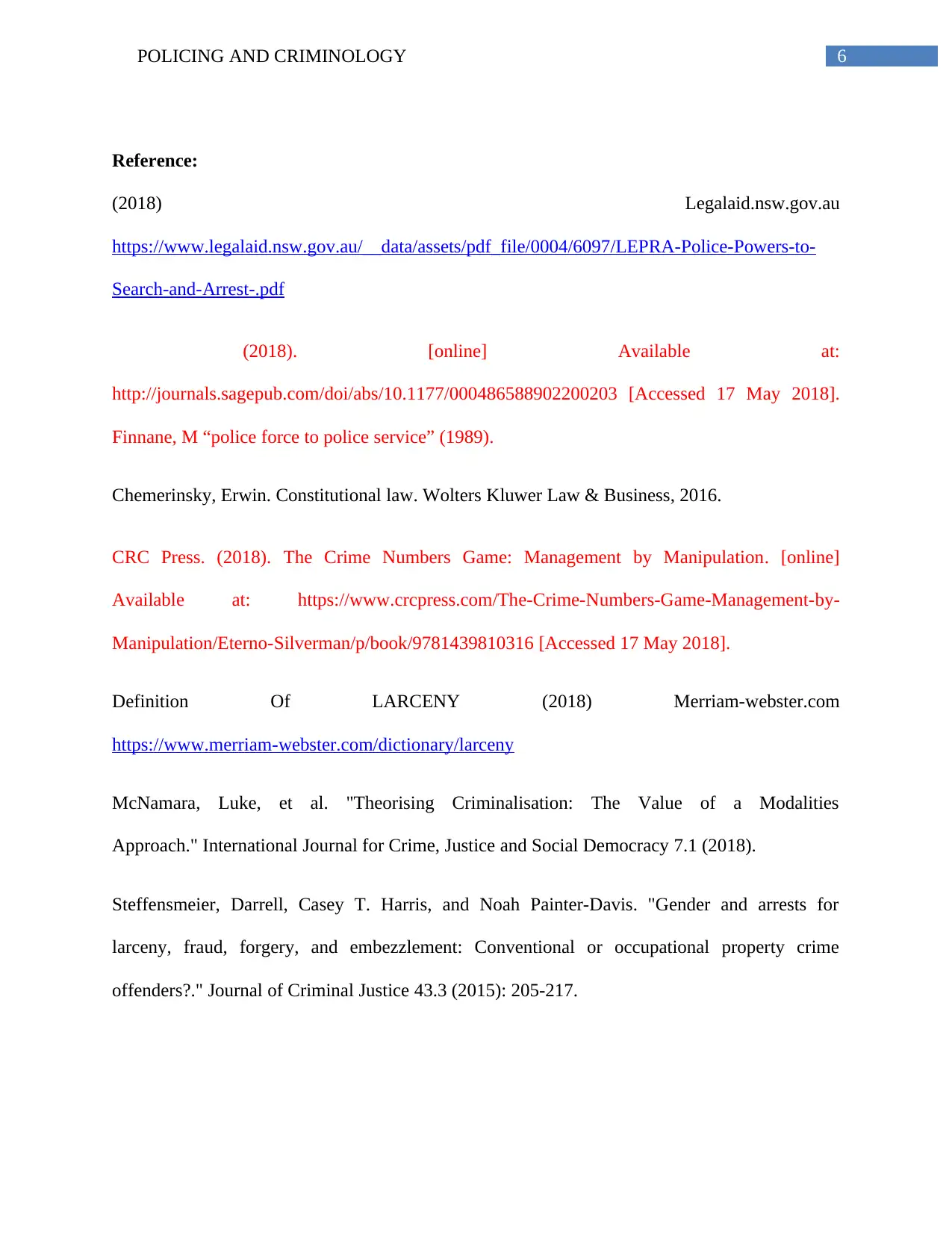
6POLICING AND CRIMINOLOGY
Reference:
(2018) Legalaid.nsw.gov.au
https://www.legalaid.nsw.gov.au/__data/assets/pdf_file/0004/6097/LEPRA-Police-Powers-to-
Search-and-Arrest-.pdf
(2018). [online] Available at:
http://journals.sagepub.com/doi/abs/10.1177/000486588902200203 [Accessed 17 May 2018].
Finnane, M “police force to police service” (1989).
Chemerinsky, Erwin. Constitutional law. Wolters Kluwer Law & Business, 2016.
CRC Press. (2018). The Crime Numbers Game: Management by Manipulation. [online]
Available at: https://www.crcpress.com/The-Crime-Numbers-Game-Management-by-
Manipulation/Eterno-Silverman/p/book/9781439810316 [Accessed 17 May 2018].
Definition Of LARCENY (2018) Merriam-webster.com
https://www.merriam-webster.com/dictionary/larceny
McNamara, Luke, et al. "Theorising Criminalisation: The Value of a Modalities
Approach." International Journal for Crime, Justice and Social Democracy 7.1 (2018).
Steffensmeier, Darrell, Casey T. Harris, and Noah Painter-Davis. "Gender and arrests for
larceny, fraud, forgery, and embezzlement: Conventional or occupational property crime
offenders?." Journal of Criminal Justice 43.3 (2015): 205-217.
Reference:
(2018) Legalaid.nsw.gov.au
https://www.legalaid.nsw.gov.au/__data/assets/pdf_file/0004/6097/LEPRA-Police-Powers-to-
Search-and-Arrest-.pdf
(2018). [online] Available at:
http://journals.sagepub.com/doi/abs/10.1177/000486588902200203 [Accessed 17 May 2018].
Finnane, M “police force to police service” (1989).
Chemerinsky, Erwin. Constitutional law. Wolters Kluwer Law & Business, 2016.
CRC Press. (2018). The Crime Numbers Game: Management by Manipulation. [online]
Available at: https://www.crcpress.com/The-Crime-Numbers-Game-Management-by-
Manipulation/Eterno-Silverman/p/book/9781439810316 [Accessed 17 May 2018].
Definition Of LARCENY (2018) Merriam-webster.com
https://www.merriam-webster.com/dictionary/larceny
McNamara, Luke, et al. "Theorising Criminalisation: The Value of a Modalities
Approach." International Journal for Crime, Justice and Social Democracy 7.1 (2018).
Steffensmeier, Darrell, Casey T. Harris, and Noah Painter-Davis. "Gender and arrests for
larceny, fraud, forgery, and embezzlement: Conventional or occupational property crime
offenders?." Journal of Criminal Justice 43.3 (2015): 205-217.
Paraphrase This Document
Need a fresh take? Get an instant paraphrase of this document with our AI Paraphraser

7POLICING AND CRIMINOLOGY
`
`

8POLICING AND CRIMINOLOGY
⊘ This is a preview!⊘
Do you want full access?
Subscribe today to unlock all pages.

Trusted by 1+ million students worldwide
1 out of 9
Related Documents
Your All-in-One AI-Powered Toolkit for Academic Success.
+13062052269
info@desklib.com
Available 24*7 on WhatsApp / Email
![[object Object]](/_next/static/media/star-bottom.7253800d.svg)
Unlock your academic potential
Copyright © 2020–2026 A2Z Services. All Rights Reserved. Developed and managed by ZUCOL.





